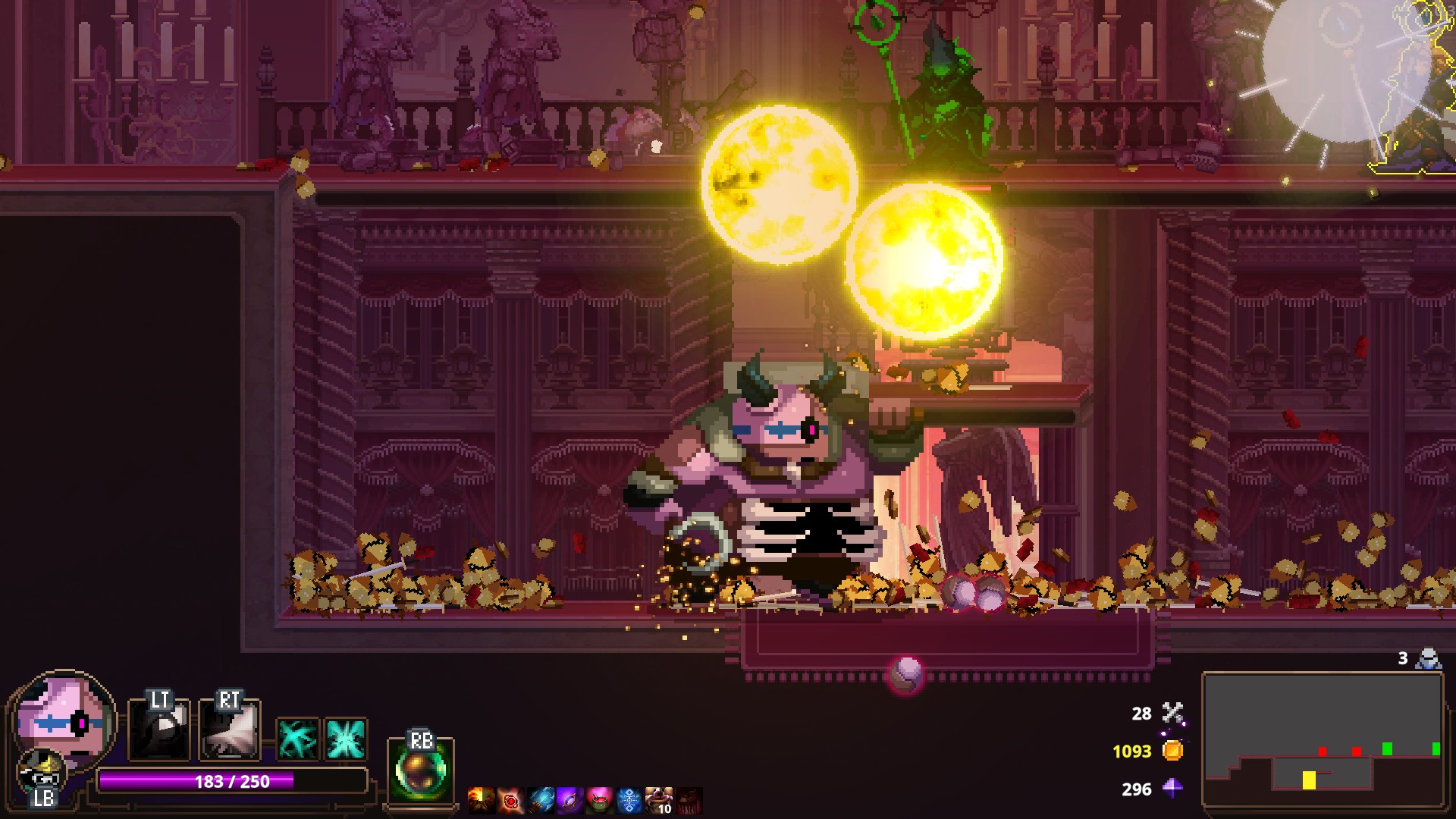I’ve become quite infatuated with SouthPAW Game’s and Neowiz’s Skul: The Hero Slayer. As a roguelite, the die-till-you-win grind is front and center, but the simple side scrolling beat-em up gameplay makes hopping back into each run a breeze. It’s incredibly easy to sink a handful of hours into without even noticing they’ve gone, early on.
But as I get towards end game territory, I’m finding it more and more difficult to reach new depths that would keep me coming back for post-end boss runs like many other games in this genre do. Racking my brain for what I think the missing piece is, I found it staring back at me in the inventory screen. Let me explain.
Skul’s (your skeletal protagonist) main gimmick is that his powers are significantly altered by picking up different heads and putting them on his shoulders. A soldier skull could make him a spear (or sword, or shield)-toting grunt. A mummy head turns him into a cursed corpse that (checks notes) shoots guns? They get even stranger. One run, I found a head that curiously had Axl Rose hair. When I put it on, Skul was suddenly equipped with a guitar that made magical, deadly music and could summon a whole ass bone band to rock every enemy on the screen to death.
It’s a strong spine to build a run-based game around. When you pick up one of these truly goofy, unique, and fun skulls, your current playthrough really picks up. But there’s no clear way to increase your chances of finding these infrequent treats, and when you do find them, it’s hard to find a way to fit them neatly into whatever current build you’re attempting to gather. Instead, you spend most of your time trying to get still good but less powerful “rare” quality skull, and wrap all your item and ability choices around making them the best they can be.
 But even that can feel arduous. Items have their own sets of passive abilities, like increasing one of your stats. Many of them also have some other sort of passive, like freezing someone who does damage to you, or doing some sort of attack periodically. On top of that, each of these have a pair of traits that give Skul even more passive abilities. Stacking these traits level up their effects in a way that would be familiar to fans of auto chess games like Teamfight Tactics – March adds more physical damage per stack, Leonia increased all healing received per stack, etc.
But even that can feel arduous. Items have their own sets of passive abilities, like increasing one of your stats. Many of them also have some other sort of passive, like freezing someone who does damage to you, or doing some sort of attack periodically. On top of that, each of these have a pair of traits that give Skul even more passive abilities. Stacking these traits level up their effects in a way that would be familiar to fans of auto chess games like Teamfight Tactics – March adds more physical damage per stack, Leonia increased all healing received per stack, etc.
This feels like too much. Games like Hades also have a large amount of stats and traits to keep track of, but Hades specifically combats the overwhelming crush of all of these numbers in at least two noticeable ways. One, you can guide the RNG of god blessings in a predictable direction thanks to the keepsakes each god gives you. If you want to make a run that’s heavy on Zeus buffs, you just equip his trinket and be on your way. Two, there’s no limit to how many buffs you can receive, so you never really have to choose between a buff you already have and one that wants to come in. There are points where Hades tries to tempt you into doing this, but it’s optional, and always involves you trading for something theoretically stronger.

Skul complicates that last one even more when you consider that the items you drop can be sold for currency to purchase things at the in game shop, but only if you’ve spent your experience points (dark quartz) on the proper upgrade. This upgrade is among the most expensive in the game, making investing in it incredibly prohibitive without EXTENSIVE grinding. Otherwise, items you pick up are largely worthless when you no longer need them, making investing an inventory slot on them in the short term feel extra bad when you let them go.
Skul throws a lot of options at you, with no way to truly feel informed about any decision you’re about to make without having put 10 hours in first. Every run feels like you’re starting completely from scratch, the vacuous maw of roguelike algorithm stands open in front you, begging you to run into the darkness with no way to influence or affect it at all. As much as the moment-to-moment side scrolling action feels truly inspired, the RPG stuff feels terminally old school.
 I get it from an overall design perspective: if almost all of your game just involves mashing the same button endlessly, layering skulls and passives and items and traits all help add some more texture to the proceedings. But I wish that I had more direct control over the winds of chance. If I could inject a little bit of determinism into the frequency or type of variables I have to choose from, I would feel like less like all of my runs are completely up to fate. Gambling is cool, until it isn’t.
I get it from an overall design perspective: if almost all of your game just involves mashing the same button endlessly, layering skulls and passives and items and traits all help add some more texture to the proceedings. But I wish that I had more direct control over the winds of chance. If I could inject a little bit of determinism into the frequency or type of variables I have to choose from, I would feel like less like all of my runs are completely up to fate. Gambling is cool, until it isn’t.
With Skul, I fear that the gambling will stop being fun right around when I finally put the final boss to rest. I’m having a great time with the game right now. By this twinge of frustration I feel every time I look at pamphlets worth of text to determine what abilities do and don’t matter loom large over my future with it.






